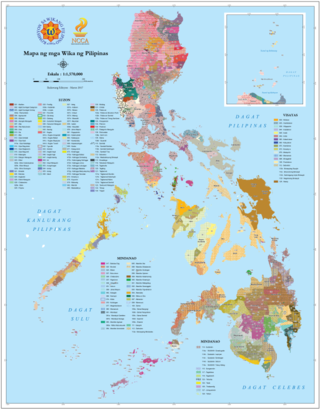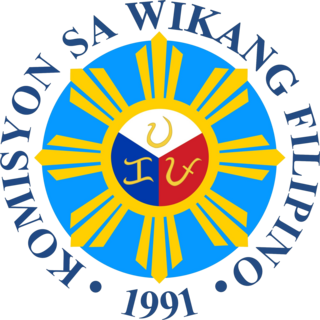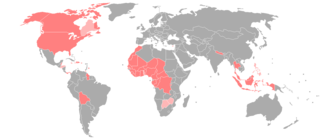
There are some 130 to 195 languages spoken in the Philippines, depending on the method of classification. Almost all are Malayo-Polynesian languages native to the archipelago. A number of Spanish-influenced creole varieties generally called Chavacano along with some local varieties of Chinese are also spoken in certain communities. The 1987 constitution designates Filipino, a standardized version of Tagalog, as the national language and an official language along with English. Filipino is regulated by Commission on the Filipino Language and serves as a lingua franca used by Filipinos of various ethnolinguistic backgrounds.

De La Salle–College of Saint Benilde, also known as DLS-CSB or Benilde, is a private, Catholic secondary and tertiary education institution established by De La Salle Brothers located in Malate district of Manila, Philippines. It operates four campuses all of which are located within the vicinity of Malate, Manila. The college is a member institution of De La Salle Philippines (DLSP), a network of 16 Catholic Lasallian institutions. Benilde is also a member of a 350-year-old international network of over 1,200 Lasallian educational institutions globally established by the De La Salle Christian Brothers in 82 countries.

The Commission on the Filipino Language (CFL), also referred to as the Komisyon sa Wikang Filipino (KWF), is the official regulating body of the Filipino language and the official government institution tasked with developing, preserving, and promoting the various local Philippine languages. The commission was established in accordance with the 1987 Constitution of the Philippines.

The World Federation of the Deaf (WFD) is an international non-governmental organization that acts as a peak body for national associations of Deaf people, with a focus on deaf people who use sign language and their family and friends. WFD aims to promote the human rights of deaf people worldwide, by working closely with the United Nations and various UN agencies such as the International Labour Organization and the World Health Organization. WFD is also a member of the International Disability Alliance (IDA).
Kenyan Sign Language is a sign language is used by the deaf community in Kenya and Somalia. It is used by over half of Kenya's estimated 600,000 deaf population. There are some dialect differences between Kisumu, Mombasa and Somalia.

Manila Christian Computer Institute for the Deaf (MCCID) is a non-sectarian, post-secondary, Christian foundation school for the deaf in the Philippines authorized by the Technical Education and Skills Development Authority (TESDA) to offer non-degree computer and other technical training programs.

The Center for Media Freedom and Responsibility (CMFR) is a private, non-stock, non-profit foundation in the Philippines that has focused its endeavor on press freedom protection along with the establishment of a framework of responsibility for its practice. Its programs represent efforts to protect the press as well as to promote professional and ethical values in journalistic practice.
In 2003 and following years, initiatives were instituted to improve internet access for people with disabilities in the Philippines. These measures were inspired by the UNESCAP "Asia-Pacific Decade for Disabled Persons" (1993–2002). Key organizations included the government body National Council for the Welfare of Disabled Persons (Philippines) and the private sector body Philippine Web Accessibility Group (PWAG). The "Disabled Friendly Website Awards" were launched to encourage web designers to incorporate universal access. Since 2009 unhampered access to Information and Communications Technology (ICT) has been in the second National Human Rights Action Plan of the Philippine government.

The Alliance of Concerned Teachers (ACT-Teachers) is a progressive national democratic mass organization of teachers, academics, and other education workers in the Philippines, established on June 26, 1982. It is the largest non-traditional teachers' organization in the country, and campaigns for the economic and political rights of teachers and other education workers as well as on wider social and political issues.

The Technical Education and Skills Development Authority serves as the Philippines' Technical Vocational Education and Training (TVET) authority. As a government agency, TESDA is tasked to both manage and supervise the Philippines' Technical Education and Skills Development (TESD). Its goals are to develop the Filipino workforce with "world-class competence and positive work values" and to provide quality technical-educational and skills development through its direction, policies, and programs.

The National Museum of the Philippines is an umbrella government organization that oversees a number of national museums in the Philippines including ethnographic, anthropological, archaeological, and visual arts collections. From 1973 until 2021, the National Museum served as the regulatory and enforcement agency of the government of the Philippines in the restoring and safeguarding of significant cultural properties, sites, and reservations throughout the Philippines. The mandate has since been transferred to the National Commission for Culture and the Arts.

The Philippines' National Council on Disability Affairs (NCDA) is the national government agency mandated to formulate policies and coordinate the activities of all agencies, whether public or private, concerning disability issues and concerns. As such, the NCWDP is the lead agency tasked to steer the course of program development for persons with disabilities and the delivery of services to the sector.

Filipino Sign Language (FSL) or Philippine Sign Language, is a sign language originating in the Philippines. Like other sign languages, FSL is a unique language with its own grammar, syntax and morphology; it is not based on and does not resemble Filipino or English. Some researchers consider the indigenous signs of FSL to be at risk of being lost due to the increasing influence of American Sign Language.
The Japanese Federation of the Deaf (JFD) is the national organization of the Deaf in Japan. JFD is also a member organization of the World Federation of the Deaf.
The Commission on Filipinos Overseas (CFO) is an agency of the government of the Philippines under the Office of the President of the Philippines. CFO was established on June 16, 1980, through the enactment of Batas Pambansa Blg. 79.
CIBI Information, Inc. or CIBI, formerly known as Credit Information Bureau, Inc., is the first and the only local credit bureau in the Philippines. CIBI started as a government entity under the Central Bank of the Philippines Department of Loans and Credit to initiate a credit information exchange system in the country. Founded in 1982, CIBI was established through the power of Presidential Decree 1941 created under Central Bank of the Philippines, now Bangko Sentral ng Pilipinas (BSP); the Securities and Exchange Commission (SEC) and the Financial Executives Institute of the Philippines (FINEX)

American Sign Language (ASL) developed in the United States, starting as a blend of local sign languages and French Sign Language (FSL). Local varieties have developed in many countries, but there is little research on which should be considered dialects of ASL and which have diverged to the point of being distinct languages.
Deafness in France is a topic that is relevant to individuality, education, and community. France has a long-running history of involvement with DHH individuals, especially during World War II. There were reportedly about 10,000,000 hearing impaired people in France as of 2014, of whom about 360,000 had "very serious or total" functional limitations, meaning unable to hear a conversation with multiple people and identifying as deaf or hard of hearing. While FSL is the main signed language in France, ASL is studied and used commonly, and French Cued Speech, a mixture of spoken French and FSL, is also not uncommon.
The Filipino Sign Language (FSL) is the official language of education for deaf Filipinos, which number around 121,000 as of 2000.













